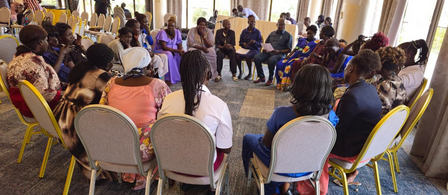South Sudanese women from Jonglei State and the Greater Pibor Administrative Area (GPAA) on Monday held their first-ever joint peace conference in Juba in an effort to curb revenge killings, child abductions, and gender-based violence that have devastated their communities for years.
The five-day conference, organized by Peace Canal under its Bridges of Peace program, brought together women leaders from Greater Bor, Greater Akobo, Ayod, and Pibor.
The Creators of Peace Circles targeted women from the Nuer, Murle, and Dinka communities of Agar and Bor groups, often caught in cycles of violence.
According to the organizers, the objective of the conference was to create a safe space for women from diverse backgrounds to connect, build resilience, and enhance their capacity to foster peace in their families and communities. It also aims to empower women to take responsibility for their actions and use their creativity to contribute uniquely to community well-being.
“This is the first women’s conference in Peace Canal, something we have been waiting for, and finally it has happened,” said Nyadow Biel Makuach, the program coordinator. “Some of the things men cannot do, women can do. They are the mothers of the children being abducted, and the wives of the men fueling the conflict. If women intervene in peace initiatives, a big change will occur in our communities.”
Makuach stressed that women hold a unique role in peacebuilding because of their close ties to those both affected by and fueling the conflict.
For participants, the gathering was not just about dialogue but about survival and dignity for South Sudanese women and Children.
Mary Kech Buol, from Bor County’s Women’s Protection Team, spoke through an interpreter about women’s determination to prevent their communities from sliding back into violence.
“We are almost now to the point, so be with us and support us so that this peace should not go back to violence, and we continue building on what we have already,” she said.
Buol explained that while young men are supported with cattle trading to keep them away from conflict, women are still left behind economically.
“For us as women, we will come out with a resolution that we’re requesting partners to support us in income, livelihood, like trading, so that also we can do our trading like what the youth are doing now,” she added.
Mama Mary Baal, another participant and Protection Team member from GPAA, described the steps women have already taken on the ground to mediate conflicts and protect vulnerable children.
“The peace that we started, we started with our own young men who are fighting themselves, and we are starting to resolve their differences,” she said.
She explained how women not only negotiate peace but also advocate for girls’ education in places where many girls are still denied schooling.
“The initiative that we are starting again is advocating for the girl-child education, because previously, the Murle girls were not educated. That is why we are advocating for the girl-child education,” she said.
The women also campaign against atrocities such as child abduction, urging mothers not to accept abducted children into their homes.
“We ask all our women not to accept any child that is brought to them by abductors. Let them ask them to return it to its rightful owner,” Mary Baal stressed.
In the past, women’s participation in peace talks was minimal and often tokenistic. Makuach recalled times when only one woman would be invited to a meeting of 20 men, with little opportunity to contribute.
“Now we are increasing women’s participation to show that women can take on this role,” she said.
Peace Canal said the conference was not only about dialogue but also about training women as “peace fighters” who will return to their communities to spread peace messaging and intervene when violence threatens.
“Our goal is to end conflict in our communities. We believe women have a big hand in reducing revenge killings, abductions, and violence,” Makuach added.
For many of the women present, the pain of conflict is personal.
“What we know as women is that we are the victims always when fighting or clashes happen,” said Mama Mary. “We are the ones suffering because we are carrying babies on our backs, and we are suffering. We take them, they are crying for us, they want food, but we don’t have. We are the ones most suffering in this crisis.”
Despite the suffering, the message from Bor was one of hope: women are no longer content to sit on the sidelines of peace efforts. They are determined to be the backbone of peacebuilding in South Sudan.




